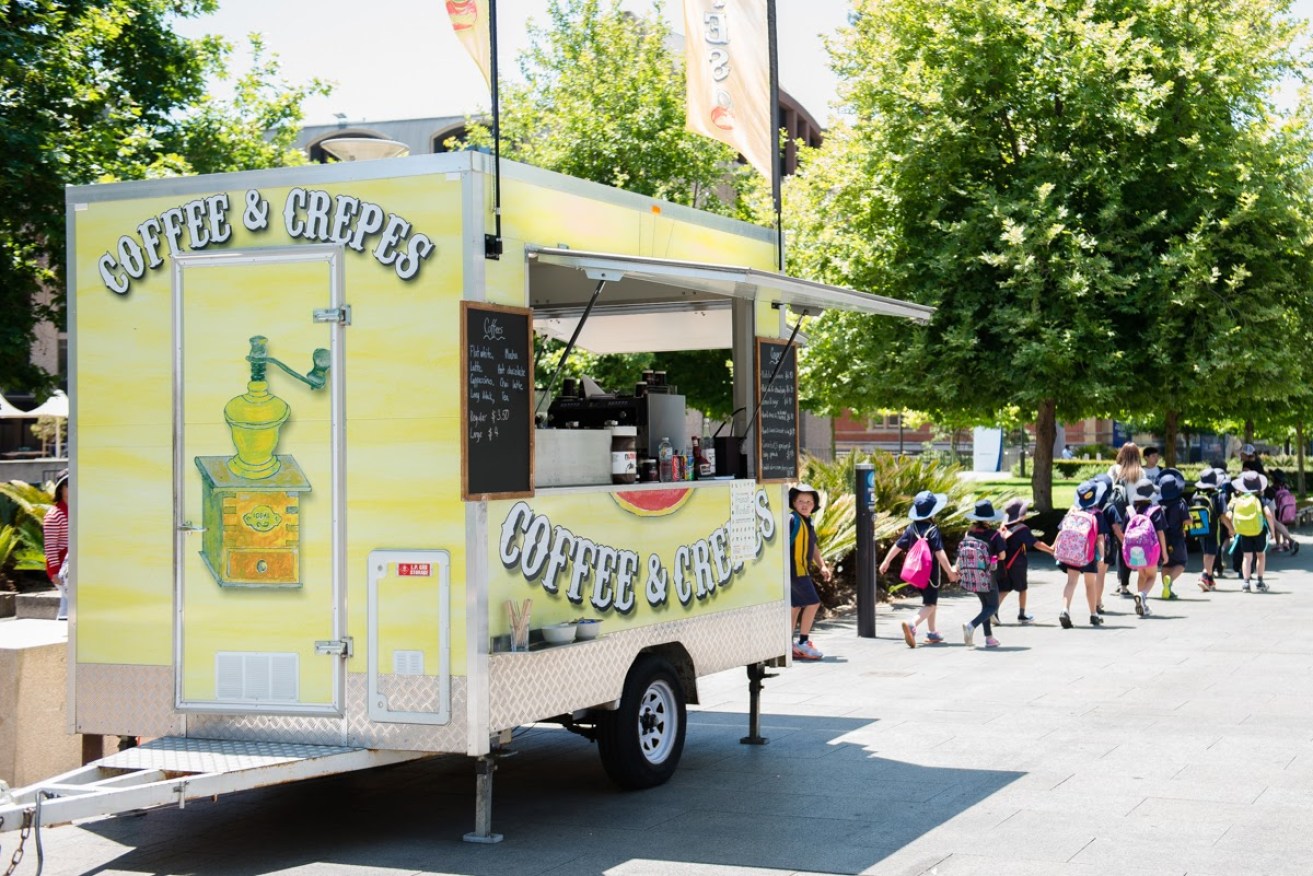Govt faces uphill battle to pass food trucks overhaul
The State Government will likely struggle to pass its overhaul of the food truck industry through parliament, InDaily can reveal.


The Coffee & Crepes food truck, trading on North Terrace. Photo: Nat Rogers/InDaily
In August, the Government introduced laws that would force councils to automatically grant food truck permits on request, with no cap on the number of licences available or time limits imposed on when vendors can operate.
That legislation is expected to pass through the House of Assembly next week – but getting it through the Legislative Council will be a difficult negotiating task for the Government.
Given Liberal Party opposition to the bill, the Government must convince at least four cross benchers to support it for its new licensing regime to come into effect.
The SA Greens and Dignity for Disability MLC Kelly Vincent say they are considering offering conditional support for the bill, but Family First MLC Robert Brokenshire says his party has “some major problems with the food trucks” and independent MLC John Darley says the bill would give mobile food vendors an “unfair competitive advantage” over traditional businesses.
Brokenshire told InDaily: “We have some major problems with the food trucks – it looks like we’ll find it difficult to support the proposal.”
“They’re very much advantaged [compared] to retailers.
“It may have too many risks to existing businesses.”
He also questioned the hygiene of food trucks, given that they “haven’t got proper toilets and washing facilities”.
Darley told InDaily he believed the yearly fee for a food truck licence proposed by the government – $2000, he said – was “miles away” from what was fair to traditional food businesses renting space in buildings.
He said food truck operators should pay fees and taxes on the basis of how many square metres they occupy on the road – and that those fees and taxes should be equivalent to the costs of operating a fixed business on the equivalent section of land.
He added that a ballpark estimate of a yearly fee he believed to be fair was $15,000 per year for a food truck in the CBD.
While he was still “working on” a more precise figure, but it would have to be “certainly a lot more than $2000”.
Labor MP Chris Picton said he was talking to crossbenchers about the bill and was hopeful they – and “even the Liberal Party” – could be convinced to come around to the Government’s side of the argument.
He said the detail of government regulations associated with the bill would be an important factor in negotiations to pass the bill itself.
“We’re very glad that at least the cross benchers are going to work with us [on] the detail of this bill,” Picton told InDaily adding that the Liberal Party would be defending the interests of big business against small business if it persisted in opposing the bill.
“They’ve basically stood up for a couple of big property developers,” he said.
“The general public are very supportive [of the food trucks industry].
“We’re still hopeful that even the Liberal Party might change their view.”
Picton also argued that it was unfair to compare all the costs of a fixed business with only the licence fee proposed to be paid by a mobile food vendor under the new laws, because mobile operators also had to pay for their trucks, and often rented space in the suburbs to prepare food and warehouse their vehicles.
He said the government was preparing to launch a petition in favour of its food truck regulation reforms, which he said would promote the nascent industry but ensure fixed businesses aren’t unfairly disadvantaged.
But Liberal MP Steven Griffiths said the Government’s bill would add unnecessary regulation onto every local council, and that food trucks would not operate in all council areas.
“We’re against it – our position hasn’t changed,” he said.
“The current way that it’s regulated through local government is appropriate.”
He added that the bill would not be “the fixer of the economy”.
There is, however, some support on the cross bench for the Government’s bill.
Vincent told InDaily she was “considering supporting the Government’s move to ensure consistent regulation of food truck businesses across metropolitan Adelaide”.
“However, we are mindful of the perceived impact on and perspective of those with ‘bricks and mortar’ food businesses in the CBD.”
Franks said she was broadly in favour of consistent rules for food trucks across the state, but that it was “odd that the State Government wants to give food trucks free reign to roam yet keep small bars firmly within the city limits”.




